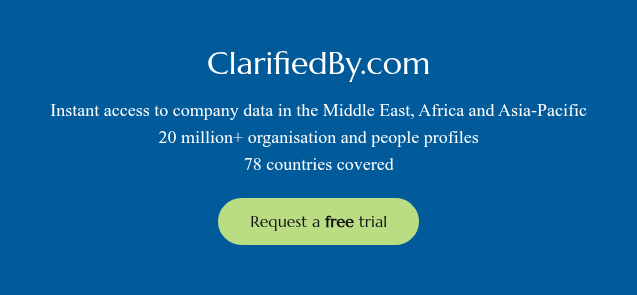Why understanding cross-border ownership is critical for KYB compliance
Read moreBridging continents: Real-world examples of cross-ownership between Asia-Pacific, the Middle East and Africa
In today’s hyper-connected global economy, corporate ownership no longer stops at regional borders. Businesses across the Asia-Pacific, Middle East, and Africa are increasingly intertwined through strategic investments, joint ventures, and cross-border acquisitions. These ownership structures reflect not only the flow of capital but also the growing interdependence between emerging and established markets across continents.
From Gulf sovereign wealth funds investing in Chinese tech giants to Indian telecom firms expanding deep into African markets, cross-ownership is reshaping the global business landscape. In this blog, I explore real-world examples of equity cross-holdings between companies in these regions.
Table of contents
Asia-Pacific companies with Middle East/Africa ownership
Asia-Pacific firms owning African or Middle Eastern companies
Other significant Asia-to-Gulf investments
The KYB implications of cross-regional ownership
Asia-Pacific companies with Middle East/Africa ownership
1. ADQ & Plenary (UAE → Australia)
In February of this year, Abu Dhabi Investment firm ADQ finalised it’s 49% stake in Australian infrastructure manager Plenary, valuing the deal at approximately US$650 million.1
One month earlier, in January, the UAE’s ADNOC Logistics & Services acquired an 80% stake in Singapore based shipping pool operator Navig8 for $1.04 Billion. Navig8 manages a fleet of tankers operating across Asia.2
3. ADIA, Mubadala & Wanda Mall (UAE → China)
In March 2024, both ADIA and Mubadala jointly acquired a major stake in Dalian Wanda’s shopping mall division in China—part of billions of dollars in Gulf capital deployed in Chinese retail and logistics.3
In 2023, Emirati sovereign wealth fund Mubadala co-led a $2 billion investment into Chinese online retailer Shein, giving it significant ownership and influence in one of Asia's largest ecommerce platforms.4
Asia-Pacific firms owning African or Middle Eastern companies
5. Bharti Airtel & Airtel Africa (India → Africa)
Indian telecom giant Bharti Airtel acquired Kuwait’s Zain Africa operations in 2010, forming Airtel Africa, which operates across 15+ African countries. Airtel Africa remains a subsidiary of the Indian parent.5
6. Aster DM Healthcare (UAE/India cross-registering)
Aster DM Healthcare is registered in India but headquartered in Dubai (UAE), operating hospitals, clinics, labs, and pharmacies across GCC and India.
7. ACWA Power (Saudi owned, Asia-Pacific operations)
Saudi Arabia’s Public Investment Fund (PIF) owns around 44% of ACWA Power, a utility and renewables developer with operations spanning the Middle East, Africa, Central Asia and Southeast Asia.6
Other significant Asia-to-Gulf investments
While not always direct ownership, many cross-region equity investments reflect similar ties:
- Abu Dhabi’s SWFs (ADQ, Mubadala, ADIA) have invested in Indian technology firms like Reliance Retail Ventures, Manipal Hospitals, Lenskart, Byju’s, and Flipkart—creating ownership stakes in leading APAC digital and healthcare companies.
- UAE’s Mubadala and Aramco have stakes in Chinese companies across energy and EV supply chains—such as Rongsheng Petrochemical, Hengli, and Nio.
The KYB implications of cross-regional ownership
These examples of cross-regional ownership aren't just interesting from a business perspective—they carry significant implications for Know Your Business (KYB) and compliance teams.
Global entities often operate through layered and opaque corporate structures, making it essential to trace UBOs across jurisdictions to identify who truly controls a company. With investments stretching across Asia, the UAE, and Africa, businesses must navigate a patchwork of regulatory environments, each with its own rules on disclosure, licensing, and ownership transparency.
When state-owned enterprises or sovereign wealth funds are involved, the stakes are even higher, as these entities may trigger additional scrutiny due to sanctions exposure or political sensitivities. Finally, KYB processes must account for the dynamic nature of ownership—equity stakes can shift rapidly, making continuous monitoring a necessity rather than a luxury.
Diligencia has enhanced its ClarifiedBy platform by integrating real-time company registry data from key Asia-Pacific jurisdictions, including Australia, China, New Zealand and Vietnam. This expansion supports global clients with due diligence, KYC/KYB, and onboarding needs beyond the Middle East and Africa. By offering verified data from official sources, the platform enables faster, more accurate decision-making while maintaining high standards of transparency and trust.
FOOTNOTES
- https://constructionfront.com/2025-02-25-adq-completes-strategic-investment-in-plenary-group/
- https://www.navig8group.com/news/navig8-assets/navig8-announces-completion-of-80-acquisition-by-adnoc-ls-for-1-04-billion/
- https://www.agbi.com/retail/2024/04/adia-and-mubadala-join-8-3bn-china-shopping-mall-deal/
- https://ww.fashionnetwork.com/news/Shein-secures-2-billion-in-new-funding-round,1518770.html
- https://www.reuters.com/article/markets/asia/bharti-closes-9-billion-zain-africa-deal-idUSTRE6570VJ/
- https://www.agbi.com/renewable-energy/2025/05/pif-and-acwa-power-to-team-up-for-3gw-wind-farm/

